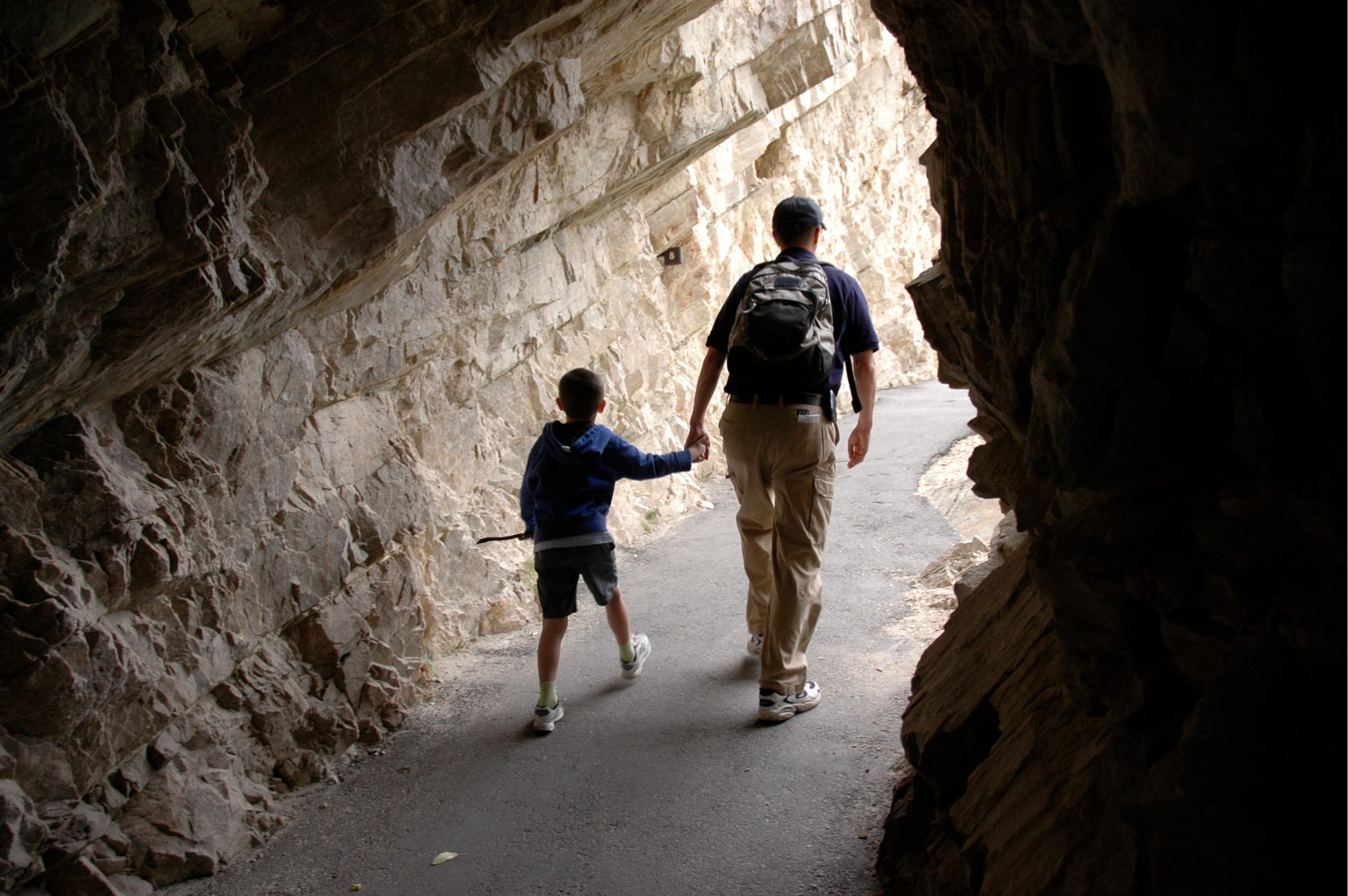Loving and teaching our children is our responsibility and privilege. Our efforts will be ineffective, however, unless THEY choose to TRUST us. Without that trust, they won’t feel our love, no matter how much we give them, nor will they be able to learn from us.
How We Gain the Trust of Our Children
But how do we gain their trust? Is there anything we can do to facilitate the choice on their part to trust us?
Allow me to illustrate with an experience. For years I was a Boy Scout leader and regularly took groups of twenty to thirty boys on adventures as risky as possible without threatening their lives.
Why? Because love can be given unconditionally—felt unconditionally—but confidence IS conditional. It has to be earned by taking risks, exercising faith, falling down, and succeeding.
So, I often took the boys whitewater canoeing in high-risk rapids, rappelling off 200-foot cliffs, hiking in dangerous canyons, and more. One of our activities was caving.
Before I took the boys on these crazy outings, I always went by myself—often a week or two before I took the boys—but accompanied by an expert in that particular activity. The boys didn’t know that whatever we were doing was my second time.
My first caving experience was with a world-class expert, who took me to a local cave known only to the regional caving club. The cave was deep, tortuous, and potentially perilous. Over the years, more than one person had died from getting lost in the cave, so the club sealed up the entrance with concrete and a locked steel door.
If I hadn’t been preparing to lead the Scouts on this adventure, I would never have done this. I am not fond of narrow spaces, and we went through some passages that were tighter and more twisted than I would have thought possible. But I was not afraid.
Why not? Because before we entered the mouth of the cave, I decided that I would trust the man leading me—completely. It was a choice. I didn’t know him well. He was about my age, and he was far less educated than I. So, why would I choose to trust him?
Choosing Someone to Trust
I suggest two criteria for choosing someone to trust: first, evidence that they know what they're doing, and second, no evidence that they want to hurt you.
One of the most difficult choices we ever make is to completely surrender to the guidance of another person, and yet we do it more often than we know, using the criteria above. Whether or not you’re aware of it, this is how you choose to trust the pilot of the plane when you fly, and it’s how you trust your surgeon or dentist.
Once we’ve chosen to really trust someone, remarkable conditions follow:
- We’re not burdened by over-thinking everything, because our guide is doing that for us.
- We’re not afraid, because none of the potentially risky decisions are ours to make.
- We’re confident, because our guide or mentor has successfully navigated this part of the journey and proven that this method works.
- We’re free to enjoy the view.
Examples of Trust
When I fly, I never give a thought to take-off, altitude, direction, velocity, weather, or landing, because I choose before I board the plane to completely trust the pilot. I do the same with my surgeons. I did this with my caving guide.
Knowing the potential dangers of being in a difficult cave—including death—I was as calm as a summer’s breeze, because I had chosen to trust my guide. Then I had only one job: to follow him.
I followed his headlamp and listened to every word he spoke. So I was free to enjoy the wonders of the cave. We twisted and turned. We used ropes to descend into a hole so dark and deep that it seemed bottomless. We crawled through spaces I would have thought difficult for a cockroach.
On one occasion I turned a corner, and he was simply gone. Vanished, along with the path, because I found myself at a dead end. For a moment, I had a doubt about what I would do, but then I remembered my decision simply to follow him.
Looking around the small cul-de-sac where I stood, I saw a hole in the wall about chest high, and—sure enough—it was the beginning of a tunnel. Peering inside, I could see his light bobbing ahead. This tunnel was so small that I could navigate it only by putting my arms straight out in front of me, moving forward only with the use of my fingers and toes. No fear, just trusting and surrendering.
No fear for the rest of the journey. No thinking about difficult forks or passages, because my job was simply to trust and follow. Two hours later, we emerged into the night air of the desert with smiles on our faces. What a trip.
If I had tried to navigate this cave alone, I’m convinced my body would still be there. And if I had not chosen to trust my guide, my doubts and fears would have made the experience nothing but misery.
Imagine if every few seconds in the cave I had said things like, “Are you sure this is the right way to take?” or “That hole looks too deep,” or “Oh, I don’t know,” or “I think this way would be better.”
At one point, as I was descending through a hole in the cave floor, my guide mistakenly told me to step down with my left foot—instead of my right—and as a result, I stumbled and fell.
I was secured by a climbing rope, but still my face slammed painfully into the rock wall. At that point, I could easily have justified withdrawing my trust in this man, but no, in that moment I needed his help even more, so I chose to trust him more.
How Our Children Know They Can Trust Us
Without a guide, our children are lost in a cave. They need our help, but if we’re impaired by our own emptiness and fear, we (1) won’t know HOW to help them, and (2) our fears will readily be apparent, as will our reactive, selfish behaviors.
Unless we feel unconditionally loved ourselves, we will fail to meet the criteria above for fostering their trust: (1) evidence that we know what we're doing, and (2) no evidence that we would hurt them.
As we parents study Real Love and practice telling the truth about our mistakes, we demonstrate that we know what we’re doing. Criterion #1 is satisfied. As we steadily practice loving them—without disappointment and anger—we build evidence that we do not want to hurt them. Criterion #2 satisfied.
The entire process of loving and teaching is of no worth to our children unless they trust us, and now we’ve learned that we can actively create an atmosphere where they find it easier to choose trusting us. Once they have chosen to trust us, everything becomes exponentially easier:
- They don’t have to learn everything from the beginning, just follow us, as I did with my cave guide.
- They immediately lose their fear of us and resentment for past mistakes.
- They have a place to turn whenever they feel lost or afraid.
- They feel peaceful, enveloped in the love we provide.
You want to save your children’s lives? Then learn all you can about loving and teaching. Practice it every day.
Tell the truth about yourself to people who can love you unconditionally. Practice being truthful and loving with your children.
And you will create the light in the cave that your children will want to follow.


